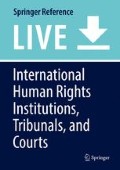Abstract
The United Nations Educational, Scientific, and Cultural Organization (UNESCO) was set up in November 1945 as an autonomous United Nations organization or specialized agency under Article 57 of the UN Charter. Human rights are at the heart of UNESCO’s mandate. Article I(1) of UNESCO’s Constitution states that the purpose of the organization is to contribute to peace and security by promoting collaboration among the nations through education, science, and culture in order to further universal respect for justice, for the rule of law, and for the human rights and fundamental freedoms which are affirmed for the peoples of the world, without distinction of race, sex, language, or religion, by the Charter of the United Nations. Following this mandate, Member States of UNESCO have adopted numerous legal instruments in the field of human rights, related to education, culture, and science of communication. UNESCO has further developed many programs and activities to advance and promote human rights in these fields. UNESCO also has a procedure to assess complaints about alleged human rights violations in its fields of competence. This chapter outlines the general structure and functioning of UNESCO; gives an overview of various instruments, strategy, and activities of UNESCO in relation to human rights; and discusses the communication procedure.
References
Beiter KD (2006) The protection of the right to education by international law: including a systematic analysis of article 13 of the International Covenant on Economic, Social and Cultural Rights. Martinus Nijhoff Publishers, The Hague
Coomans F (1999) UNESCO and human rights. In: Hanski R, Suksi M (eds) An introduction to the international protection of human rights, 2nd edn. Institute for Human Rights at Abo Akademi University, Turku, pp 219–230
Donders Y (forthcoming 2018) UNESCO’s communications procedure on human rights. In: Rodley N, Van Ho T (eds) Research handbook on human rights institutions and enforcement. Edward Elgar Publishing, London
Dumont GH (1990) A behind-the-scenes struggle for human rights. The UNESCO Courier, Paris, pp 43–45
Executive Board, Committee on Conventions and Recommendations, Information Report, UNESCO Doc. 181 EX/CR/2 Rev, Paris, 18 Mar 2016. Available at http://unesdoc.unesco.org/images/0024/002439/243902e.pdf. Accessed 8 Mar 2018
Marks SP (1999) The complaints procedure of the United Nations educational, scientific and cultural organization. In: Hannum H (ed) Guide to international human rights law practice, 3rd edn. Transnational Publishers, Ardsley, pp 103–118
Partsch KJ, Hufner K (2003) UNESCO procedures for the protection of human rights. In: Symonides J (ed) Human rights: international protection, monitoring, enforcement. UNESCO/Ashgate Publishing, Paris, pp 111–132
Saba H (1982) UNESCO and human rights. In: Alston P, Vasak K (eds) The international dimensions of human rights: volume 1. UNESCO Publishing & Greenwood Press, Paris/Westport, pp 401–427
UNESCO and UNICEF, A Human Rights Based Approach to Education for All. Available at http://unesdoc.unesco.org/images/0015/001548/154861E.pdf. Accessed 8 Mar 2018
UNESCO Guidelines on Intercultural Education. Available at http://unesdoc.unesco.org/images/0014/001478/147878e.pdf. Accessed 8 Mar 2018
UNESCO, Intercultural Competencies – Conceptual and Operational Framework. Available at http://unesdoc.unesco.org/images/0021/002197/219768e.pdf. Accessed 8 Mar 2018
Weissbrodt D, Farley R (1994) The UNESCO human rights procedure: an evaluation. Hum Rts Q 16:391–414
UN and UNESCO Documents
14 EX/Decision 11.3 (1952) Action to be taken on communications addressed to UNESCO alleging violations of human rights, in particular educational and cultural rights, Item I
15 EX/Decision 11 (1953) Action to be taken on communications addressed to UNESCO alleging violations of human rights, in particular educational and cultural rights
18 EX/19 (7 Apr 1977) Study of the procedures which should be followed in the examination of cases and questions which might be submitted to UNESCO concerning the exercise of human rights in the spheres of its competence, in order to make its action more effective: report of the working party of the executive board
19 EX/Decisions 3.3 (1978) Study of the procedures which should be followed in the examination of cases and questions which might be submitted to UNESCO concerning the exercise of human rights in the spheres of its competence, in order to make its action more effective: report of the working party of the executive board
19C/Res 12.1 (1976) UNESCO’s contribution to peace and its tasks with respect to the promotion of human rights and the elimination of colonialism and racialism; long-term programme of measures whereby UNESCO can contribute to the strengthening of peace
20 EX/7 (25 Feb 1995) Questions relating to the methods of work of the committee on conventions and recommendations
22 EX/CR/2 Rev (18 Mar 2016) Executive board, committee on conventions and recommendations information report
ECOSOC Resolution 728 (27 May 1970) Procedure for dealing with communications relating to violations of human rights and fundamental freedoms 1503
UNESCO’s (Mar 2009) Procedure for the protection of human rights, the legislative history of the 104 EX/3.3 procedure. UNESCO, Paris. http://unesdoc.unesco.org/images/0018/001818/181839e.pdf. Accessed 8 Mar 2018
Author information
Authors and Affiliations
Corresponding author
Editor information
Editors and Affiliations
Additional information
Note: Parts of this chapter are published in Donders Y (forthcoming 2018) UNESCO’s Communications Procedure on Human Rights. In Rodley N and Van Ho T (eds) Research Handbook on Human Rights Institutions and Enforcement. Edward Elgar Publishing, London.
Rights and permissions
Copyright information
© 2018 Springer Nature Singapore Pte Ltd.
About this entry
Cite this entry
Donders, Y. (2018). UNESCO and Human Rights. In: Oberleitner, G. (eds) International Human Rights Institutions, Tribunals, and Courts. International Human Rights. Springer, Singapore. https://doi.org/10.1007/978-981-10-4516-5_25-1
Download citation
DOI: https://doi.org/10.1007/978-981-10-4516-5_25-1
Received:
Accepted:
Published:
Publisher Name: Springer, Singapore
Print ISBN: 978-981-10-4516-5
Online ISBN: 978-981-10-4516-5
eBook Packages: Springer Reference Law and CriminologyReference Module Humanities and Social SciencesReference Module Business, Economics and Social Sciences

